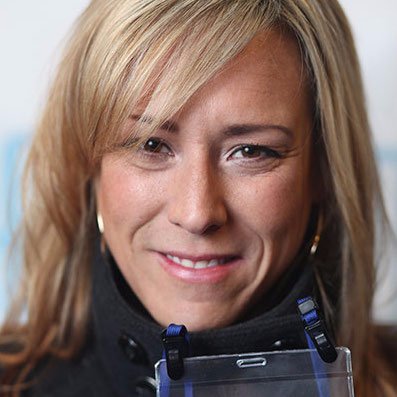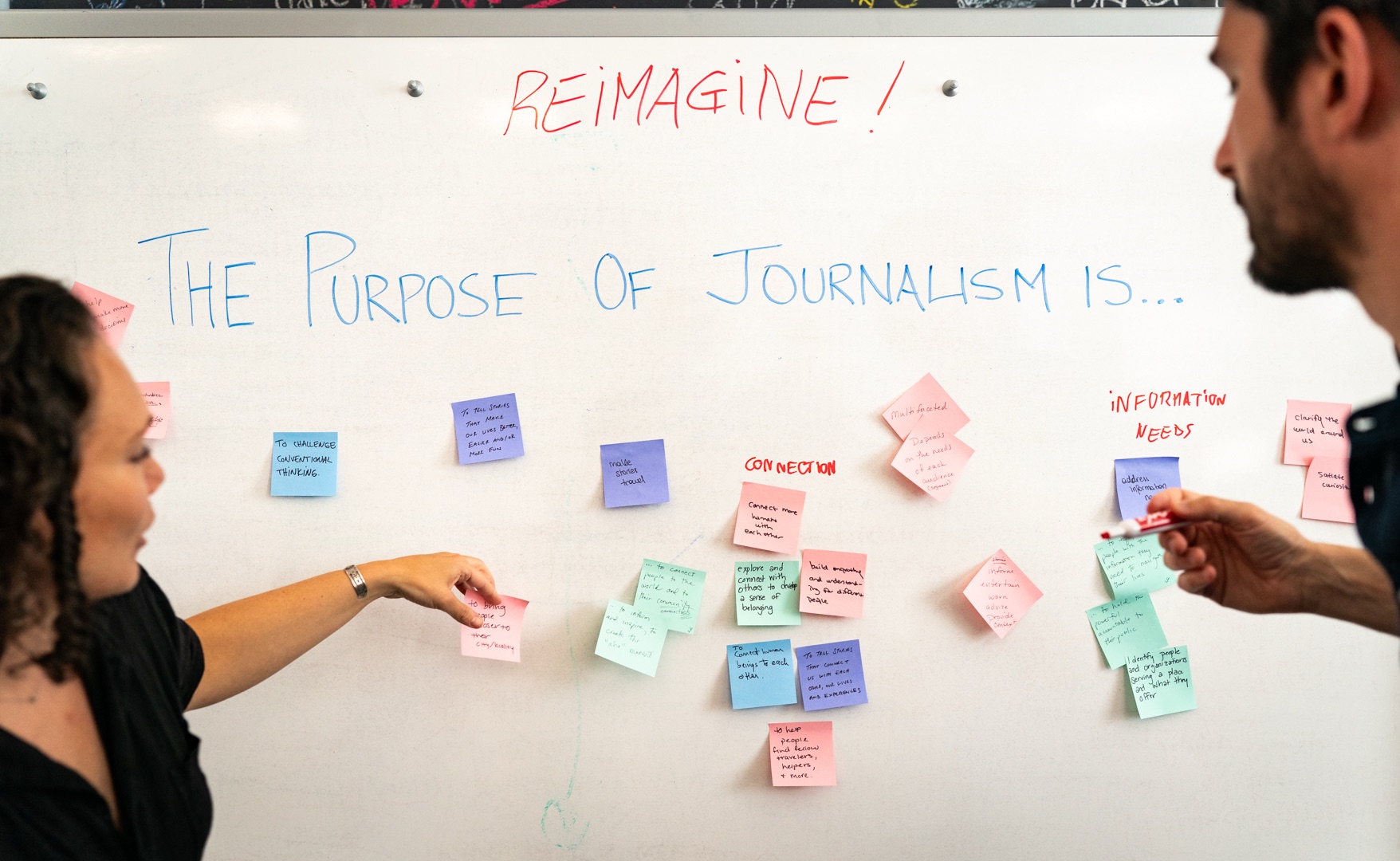[KICKS OFF SHOES. FALLS INTO CHAIR. LETS OUT AUDIBLE EXHALE.]
Oh. My. Guess what?! Last week was my first anniversary here at the Lab.
I came to this job with the intention of substantially chipping away at the media-stack, innovative-systems-for-news-publications, journalism-tech "problem." Well, that expectation was quite naïve. A university is not positioned to produce and support substantial, commercial-level software technology. One can expect ideas and students from a university. The product that a university contributes to the world is its students.
We are, however, positioned quite well to invent, design, build and support services like TimelineJS, SoundciteJS and the soon-to-be-launched StoryMapJS. And the Lab's model is designed to maximize ideas and prototypes generated by the schools' collaborative "Innovation in Journalism and Technology" class. I completely under-estimated the effect working with students would have on the Lab, or on me.
In fact, I really like how the Lab's own Rich Gordon put it recently:
The Knight Lab produces software — but not just software. We also help produce a new generation of journalists who can thrive at the intersection of journalism and technology.
This week we began recruiting some new blood, and Rich profiled five of our recent undergraduate student fellows who graduated from Northwestern in June, asking each how the Lab influenced and shaped their career directions. One of our current student fellows and Soundcite inventor, Tyler Fisher, wrote about his first year at Knight Lab and included a near-full-throated rally-call for other students to come join us. Finally, we asked incoming Northwestern freshman, Alex Duner, who eagerly reached out to us this past spring, to write about why he's excited about newsroom programming. Since publishing these pieces, we have seen an influx of new interest from incoming students as well as mid-career undergraduates. I feel so blessed and so inspired.
In addition to some inspiring students, we have put a lot out the door in the past few months. Here are some highlights:
- The Soundcite project is now in beta. We officially unveiled our most recent tool for content creators last month and, basically, SoundciteJS makes it easy for web publishers and writers to include in-line audio in their stories. We released an alpha version about two months ago and since we've been delighted to see journalists — in particular at The Washington Post and Chicago's own WBEZ — begin to play with it. If you find Soundcite useful, make sure send a "Thank You!" to its creators: student fellow and Medill student Tyler Fisher and Medill assistant professor Jeremy Gilbert. Check out the video for a quick tutorial and don't be shy about sending us any feedback: knightlab@northwestern.edu.
- We released a more substantial prototype of Neighborhood Buzz, an idea that came out of Larry Birnbaum and Jeremy's Fall 2012 Innovation in Journalism and Technology class. From Joe Germuska's update, its an experiment in summarizing the topics of conversation on Twitter by neighborhood in 20 cities across the country by collecting tweets, assigning them to a neighborhood and categorizing them topically.
- The Medill Watchdog team published their suburban transparency investigation and we helped out with the reporting and some of the presentation. We began by helping the reporters process the DuPage statements of economic interest which they were scanning to PDF. It was a similar approach, and far less streamlined (and no crowd-sourcing), to ProPublica's "Free the Files" and had some limited success. One of our student fellows, Rebecca Lai, worked with the Medill Watchdog team to design the basic presentation of the stories and we adapted the database of scanned files into a very simple publicly searchable database.
- Jenny Wilson (Lab developer), Ryan Graff (communications director) and Hilary Fung (student fellow) have been reworking the Refine project — A prototype that helps people find relevant content in a long string of comments like those on most news sites — based on some feedback.
- Scott Bradley (Lab developer), Rich (faculty) and Jessica Soberman (student fellow) have been heads down on the Untangled project — A tool is a tool that enables journalists to capture, save, analyze and share (with collaborators) information about the connections or relationships among people, businesses, organizations, government agencies and other “entities.”
- Zach Wise (faculty), Joe (chief nerd), Dhrumil Mehta and Jessica (student fellows) worked on a WordPress plugin that will help publishers with the whole putting "content in context" problem that comes up when presenting news stories within their larger, long-developed narrative. Prototype tk.
- Student fellow Dan Hill spent some time researching web scrapers for non-programmers through an open source browser plugin called Haystax from Reporter’s Lab's Tyler Dukes. He captured his research in this piece on web scrapers for journalists. (Also, in case you missed it, he wrote a great piece on fact checking Chicago Public Schools.)
- We relaunched our core site and have been slowly adding editorial features, including a regularly published Q&A series. Taking inspiration from ‘Hire humans. Not skills. Not roles.’ the series includes interviews with smart people who are shaping the future of media. Catch up on the series, or, here are some of particular note: Michael Lopp, Karen McGrane, Mark Luckie, Clay Johnson, Tasneem Raja and Chase Davis.
- We've published some fantastic editorial pieces from student fellows Hilary Sharp, Emily Ferber and Sarah Adler. Ferber's Getting GitHub: Why journalists should know and use the social coding site was particularly popular.
This summer we have been chipping a way at expanding Blueline and a systematic approach to present all of the Lab-sponsored projects, prototypes and experiments. These will eventually live on a projects site that we should have ready for prime-time in the coming months. In addition, we are working on a few other projects:
- Twxplorer is an idea that came from the Spring 2013 Innovation in Journalism and Technology class. It is a web app that enables journalists to explore and save tweets about a topic of interest.
- Slimformation was originally sketched by a team that included Joe and Larry at last year’s MozFest election-hacking session. It draws inspiration from Clay Johnson’s book, and this first prototype also came from a spring class team that included student fellow Katie Zhu. She wrote up a great piece on its alpha.
- StoryMap JS is the next content publishing tool from Zach's brain. It will be a step-by-step mapping tool that allows publishers to create an interactive experience with a story that takes place in multiple locations. Here is a rough sketch of the idea.
Its been a great year and we are excited for the up-coming one. We have a variety of open positions available for the right students and the events and training opportunities we offer can keep anyone involved. Anyone. Feel free to join our Meetup group or send us an email: knightlab@northwestern.edu!
About the author





